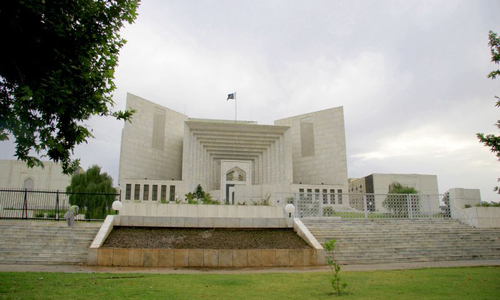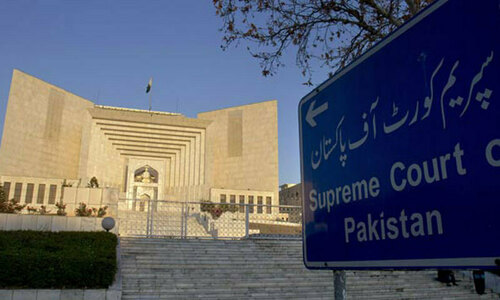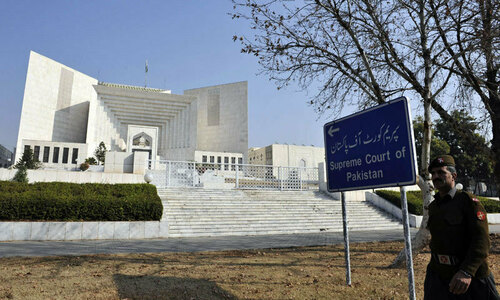ISLAMABAD: The Supreme Court put a question mark over the government’s recruitment policy on Wednesday, wondering whether it can dole out jobs by creating vacancies merely on political grounds, though such individuals remained unemployed for over a decade after their termination.
“The real question for determination before the court is: can such benefit be granted by parliament through an act by discriminating against others who are already working on a regular post,” observed Justice Umar Ata Bandial.
Justice Bandial was heading a five-judge Supreme Court bench which took up a set of petitions seeking review of the Court’s Aug 17 judgement that had rendered almost 17,000 government employees jobless.
The courtroom No 1, seized with a number of review petitions mostly submitted by the federal government, was packed with sacked employees while a large number of employees waited outside the Supreme Court premises on the Constitution Avenue.
On the eve of his retirement, Justice Mushir Alam had, on Aug 17, declared as “illegal and unconstitutional” a PPP era law called the Sacked Employees (Reinstatement) Ordinance Act 2010 (SERA) under which a number of people were employed or promoted.
The Supreme Court adjourned further proceedings to Monday (Dec 6) and hinted that a short order could come next week after day-to-day hearing.
The court ignored a request by senior counsel Raza Rabbani that till the conclusion of the case, the court order that the employees in question were entitled to medical facilities because quite a number of them were on dialysis or suffering from other diseases.
Senior counsel Wasim Sajjad, representing former employees of the Sui Northern Gas Pipelines Limited (SNGPL), emphasised that the spirit of the laws made by parliament was to provide relief, stressing that in Islam justice was always tempered with mercy.
But Justice Sajjad Ali Shah asked him to stick to the legal discourse and ignore the humanitarian aspect. The judge cited examples where an employee who was working on a regular post was superseded by a junior person upon his reinstatement after a lapse of 12 years.
While addressing Wasim Sajjad, Justice Bandial observed that many of the employees were not party before the apex court when it declared as illegal the SERA because their appointments were never challenged before a court.
However, the counsel argued that the court had declared the law illegal under a wrong impression that the sacked employees fell within the category of “civil servants” and on an assumption that these employees were covered under Article 240 and 241 of the Constitution, which deal with appointments to the “service of Pakistan” and the conditions of service.
Wasim Sajjad contended the Supreme Court received no assistance during the hearings, recalling that no such judgement was brought to its notice as could have helped it arrive at the conclusion of striking down an act of parliament.
Justice Syed Mansoor Ali Shah, a member of the bench, asked the counsel to cite a judgement of any court suggesting that even if a law was struck down by a court, employees could still be given benefits.
Justice Shah said he found it surprising that a number of persons were brought back to their jobs after 10 years in disregard to the right of others who applied for the posts during the period when the services of the former stood terminated.
But Wasim Sajjad argued that the court was not assisted properly and that the Aug 17 judgement came after a delay of 16 months. At this, Justice Qazi Muhammad Amin Ahmed reminded the counsel that the decision regarding the restoration of former Chief Justice of Pakistan Iftikhar Muhammad Chaudhry came after two years.
But senior counsel Barrister Aitzaz Ahsan explained that the reason for the delay was that the author judge was under detention.
Justice Sajjad Ali Shah observed that companies had to reinstate the employees only because of the law. “Otherwise, they never give jobs in such a manner.”
Justice Bandial observed that the law not only violated Article 25 of the Constitution, but also smacked of arbitrariness since employees cannot be reinstated across the board without following certain procedures or criteria.
Justice Bandial observed that when a law gives rise to discrimination, the Constitution steps in to rectify it.
Justice Bandial emphasised that recruitment without following a due process was a violation of Articles 4, 8, 9, 14 and 25 of the Constitution.
Wasim Sajjad argued that the ambit of the law was determined by the Supreme Court, although it was never discussed when it was taken up by high courts at the beginning of the litigation process.
Published in Dawn, December 2nd, 2021















































